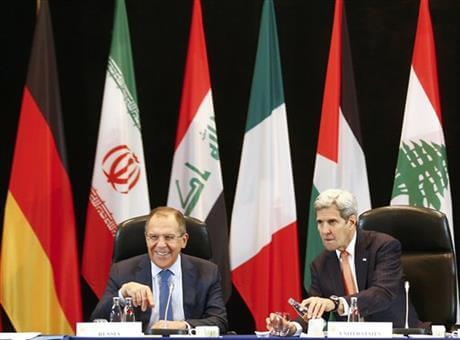
By MATTHEW LEE
The Obama administration opened a two-front campaign on Syria on Thursday with a push to end one war there and step up another.
The United States, Russia and more than a dozen other nations with interests in the Syria conflict, including Iran, gathered to try to agree on a cease-fire in the for the civil war that might resuscitate stalled peace talks.
Amid deep differences between the U.S. and Russia over the timing and conditions of the truce — and a bitter argument over who is to blame for bombing civilian areas around Aleppo, a rebel stronghold — the International Syria Support Group opened talks with no sign of an imminent breakthrough.
At the same time in Brussels, U.S. Defense Secretary Ash Carter rallied new support for the fight against the Islamic State group in largely the same territory.
Sponsored Links
Turn data into sales. Get the ABC eBook.
Microsoft
38 Celebs With The Highest IQ’s in Hollywood
Your Daily Dish
The Russian Ministry of Defense rejected a Pentagon claim that Russian aircraft hit two hospitals in Aleppo and contended that U.S. aircraft had operated over the city Wednesday.
Ministry spokesman Maj. Gen. Igor Konashenkov said Russian jets hit targets near Aleppo, and that two U.S. A-10 ground attack jets had flown from Turkey to attack Aleppo.
U.S. Army Col. Steve Warren, the Baghdad spokesman for the U.S.-led coalition against IS, called the Russian claim “a fabrication” and said the incident was an example of Russia’s “indiscriminate” use of force.
The spat complicates Kerry’s efforts with Russian Foreign Minister Sergey Lavrov to overcome deep differences between the two powers over a proposed cease-fire.
A truce is seen as critical to resuscitating peace talks between Syrian President Bashar Assad’s government and the opposition. They stalled last month before really starting, due largely to gains by Assad’s military with the heavy backing of Russian airstrikes.
Russia has proposed a March 1 cease-fire. The U.S. and others see that as a ploy that only serves to give Moscow and the Syrian army three more weeks to try to crush Western- and Arab-backed rebels. The U.S. has countered with demands for an immediate stop to the fighting, allowing peace talks to resume by Feb. 25.
Neither Kerry nor Lavrov, who met hours before the larger meeting began, would predict whether an agreement was possible.
“We’re going to have a serious conversation about all aspects about what’s happening in Syria,” Kerry said as their meeting got under way. “Obviously, at some point in time, we want to make progress on the issues of humanitarian access and cease-fire. We will talk about all aspects of the conflict.”
Lavrov said Russia had made a “quite specific” proposal and “we will wait for the American response before we take it” to the larger group.
About 20 countries and groups, including the European Union, are involved in the support group.
“The future of Syria and Syrians is in our hands,” said EU foreign policy chief Federica Mogherini, urging an immediate cease-fire.
Salem Meslet, spokesman for an opposition group, said that “we are with the political process but we have to see the humanitarian issues are solved.”
“For us it’s important to stop the Russian aggression on the Syrian people,” he said.
Five years of conflict have killed more than a quarter-million people, created Europe’s biggest refugee crisis since World War II and allowed IS to carve out its own territory across parts of Syria and neighboring Iraq.
At NATO headquarters in Brussels, Carter tried to drum up support for accelerating the fight against the militants.
Carter said defense ministers from more than two dozen countries gave a “broad endorsement” of a refined U.S. plan for defeating IS. After a meeting at NATO headquarters, Carter told reporters that nearly all participants either promised new military commitments or said their governments would consider new contributions. He predicted “tangible gains” in Iraq and Syria by March.
“We will all look back after victory and remember who participated in the fight,” he said, appealing to coalition partners to expand and deepen their military contributions.
NATO Secretary-General Jens Stoltenberg said the alliance agreed Thursday to deploy NATO airborne command and control aircraft in order to free up similar U.S. aircraft for the air campaign in Syria and Iraq.
In the latest developments on the ground, Kurdish fighters and their allies captured a military air base in northern Syria under the cover of coalition airstrikes. Russia said its air force had carried out more than 500 combat missions in Syria over the past week.
“For us, it’s important to stop the Russian aggression on the Syrian people,” said Salem Meslet, a Syrian opposition representative.
Syria’s Kurds have been among the most effective forces battling IS, but they have remained largely neutral in the conflict between Assad and the rebels fighting to overthrow him.
But on Wednesday, the main Kurdish People’s Protection Units launched an attack along with some Arab allies against the Mannagh military air base and captured it, according to a rebel commander and an opposition activist group. The Kurds appeared to be exploiting the chaos to expand their nearby enclave.
In Moscow, defense ministry spokesman Konashenkov said that since Feb. 4, Russian warplanes had conducted 510 combat missions and destroyed 888 “terrorist facilities” in several Syrian provinces, including Aleppo, Daraa and Latakia, where the government offensive is concentrated.
“We have not witnessed such bombardment since the revolution began,” said Abdul-Jabbar Abu Thabet, commander of a moderate faction fighting both Syrian government forces and IS. The uprising against Assad’s government started in March 2011.
___
Associated Press writer Nataliya Vasilyeva in Moscow, Jamey Keaten in Geneva, Bassem Mroue in Beirut, Lolita C. Baldor in Washington, Robert Burns in Brussels and Geir Moulson in Munich contributed to this report.



